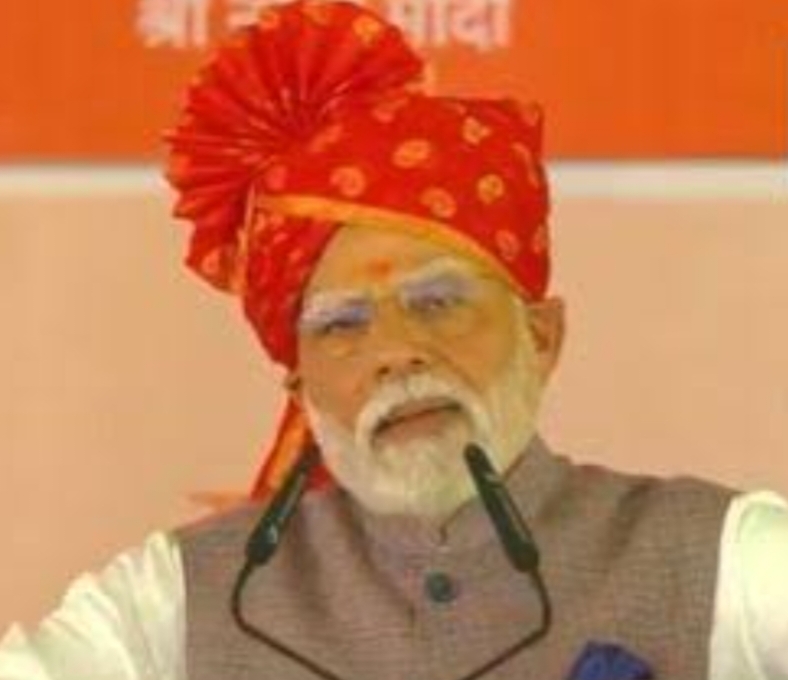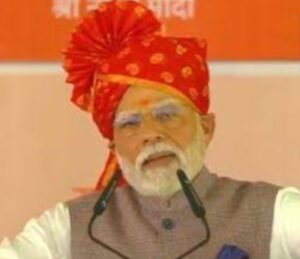Decoding PM Modi’s Fiery Rhetoric: The Hidden Message Behind “My Mind is Cool, but My Blood is Hot”
Samba Times Special

New Delhi, May 23, 2025 – In a powerful public address delivered on May 22, 2025, in Deshnoke, Bikaner, Prime Minister Narendra Modi sent shockwaves across the political landscape with his striking statement:
“Modi ka dimaag thanda hai, lekin lahu garam hai. Modi ki nasson mein, lahu nahin, garam sindoor beh raha hai…”
(“Modi’s mind is cool, but his blood is hot. Now, it’s not blood but hot sindoor flowing through Modi’s veins”). This vivid imagery, delivered in response to a recent terrorist attack in Pahalgam, has sparked widespread discussion about the underlying message and its implications for India’s stance on national security and regional geopolitics.
Context of the Statement
The Prime Minister’s remarks came during a rally in Rajasthan, following what he described as “Operation Sindoor,” a swift and decisive military response to the April 22, 2025, terrorist attack in Pahalgam. In his speech, PM Modi referenced the destruction of nine major terrorist hideouts within 22 minutes, emphasizing India’s resolute action against terrorism. The phrase, laden with cultural and emotional resonance, was directed primarily at Pakistan, signaling a stern warning to those who threaten India’s sovereignty.
According to sources, including a report by NDTV, Modi asserted, “Pakistan has forgotten that Modi, the servant of Mother India, stands tall with his chest held high.” He further clarified that this was not merely a reaction of vengeance but a new form of justice, describing it as “India’s fierce resolve.” The use of “sindoor,” a sacred vermilion powder symbolizing strength and cultural identity in Indian tradition, amplified the emotional weight of his words.
The Hidden Message
At its core, PM Modi’s statement is a masterstroke of rhetorical strategy, blending composure with passion to project a dual image of leadership: calculated restraint and unyielding resolve. The phrase “my mind is cool” underscores a strategic, composed approach to decision-making, assuring the nation that India’s actions are not impulsive but well-thought-out. Meanwhile, “my blood is hot” and the evocative reference to “garam sindoor” convey an intense commitment to protecting the nation, tapping into cultural symbolism to evoke patriotism and resilience.
Political analysts suggest that this statement serves multiple purposes:
- A Strong Message to Pakistan: By invoking “hot sindoor” and warning that Pakistan will pay a heavy price—through its military and economy—for any terrorist activities, Modi is reinforcing India’s zero-tolerance policy toward cross-border terrorism. His declaration that neither trade nor talks will proceed with Pakistan, except on the issue of Pakistan-Occupied Kashmir (PoK), signals a hardened diplomatic stance.
- Rallying Domestic Support: The emotive language resonates deeply with Indian audiences, particularly in the context of national security. By framing himself as a steadfast “servant of Mother India,” Modi taps into the collective pride of the nation, strengthening his image as a protector of Indian values and sovereignty. Posts on X reflect this sentiment, with users like @Vijay_Gautamm describing the speech as “aggressive, attacking, and filled with outrage,” yet balanced with strategic composure.
- Cultural Symbolism: The reference to “sindoor” is significant in the Indian context, where it symbolizes strength, honor, and the sacred bond of protection. By using this imagery, Modi aligns his leadership with cultural and spiritual values, appealing to the emotional core of his audience while reinforcing his resolve to safeguard the nation.
- Global Posturing: Modi’s speech also positions India as a formidable global player. By emphasizing swift military action and a no-compromise stance, he projects India’s strength to the international community, signaling that the country is capable of defending itself decisively. This aligns with his broader foreign policy achievements, such as his historic visits to nations like Nepal, Australia, and Fiji, which have bolstered India’s global standing.
Public and Political Reactions
The statement has elicited a range of reactions. Supporters, including prominent voices on X like @mahendrabhatbjp and @vinod_bansal, have hailed it as a bold warning to Pakistan, reinforcing Modi’s image as a strong leader. Critics, however, caution that such fiery rhetoric could escalate tensions in an already volatile region. Some opposition leaders argue that while the statement galvanizes public sentiment, it risks complicating diplomatic efforts to stabilize India-Pakistan relations.
Social media platforms have been abuzz with discussions, with many users interpreting the statement as a powerful metaphor for Modi’s leadership style—calm in strategy but fierce in execution. One user, @ASTHAKAUSHIK_, noted that Modi warned of dire consequences should his “cool mind” turn “hot,” underscoring the gravity of his message.
Broader Implications
This statement is not an isolated remark but part of Modi’s broader narrative of assertive nationalism, which has defined his tenure since 2014. His third consecutive term, secured with a decisive victory in the 2024 parliamentary elections, has been marked by a focus on economic development, national security, and social welfare. The reference to “Operation Sindoor” and the destruction of terrorist hideouts aligns with his government’s emphasis on robust counter-terrorism measures, as seen in previous actions like the surgical strikes post-Uri and Balakot airstrikes post-Pulwama.
Moreover, the statement reflects Modi’s ability to blend cultural symbolism with political messaging, a hallmark of his oratory. His speeches often draw on Indian traditions to connect with the masses, as seen in initiatives like “Beti Bachao, Beti Padhao” or his invocation of unity during the Khelo India Youth Games. By framing his resolve in terms of “sindoor,” Modi taps into a shared cultural consciousness, making his message both relatable and inspiring.
Conclusion
Prime Minister Narendra Modi’s declaration that “my mind is cool, but my blood is hot” is more than a rhetorical flourish—it is a carefully crafted message that balances strategic restraint with passionate resolve. It serves as a warning to adversaries, a rallying cry for citizens, and a testament to India’s growing assertiveness on the global stage. As India navigates complex regional dynamics, this statement will likely be remembered as a defining moment in Modi’s leadership, encapsulating his vision of a strong, united, and uncompromising Bharat.





